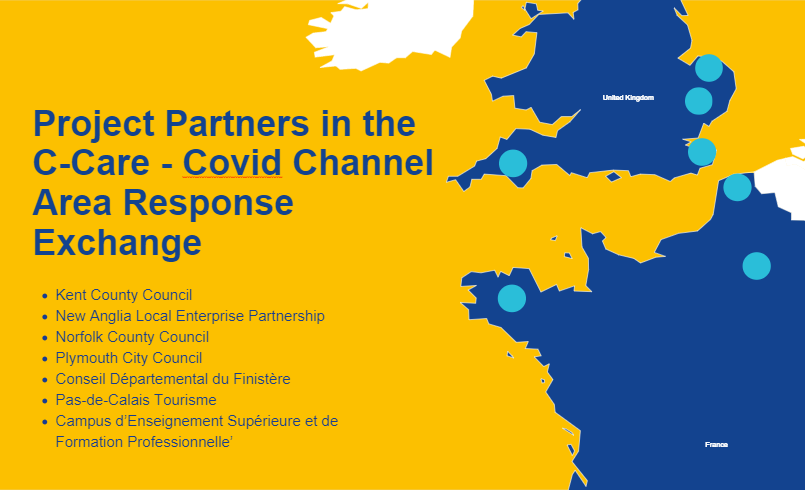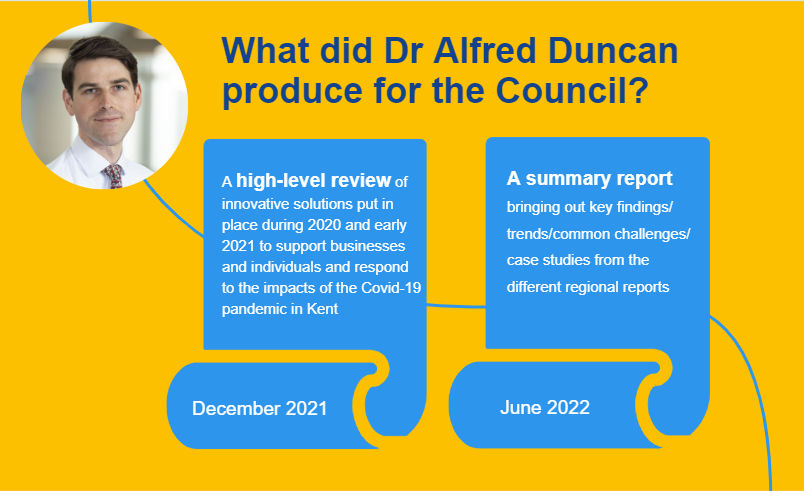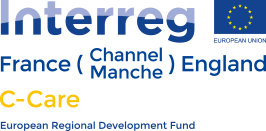In April 2021, Kent County Council launched the Covid Channel Area Response Exchange (C-Care) project, an ambitious project which aims to respond to some of the socio-economic challenges brought about by the COVID-19 pandemic. In need of external expertise to achieve the project’s aims, they approached the University of Kent to source the right knowledge for some analysis work.
The Challenge
The C-Care project, funded by the Interreg France-Channel-England European Union programme, set out to design and deliver an innovative range of schemes to provide support to over 1,900 businesses and 4,500 individuals at risk of exclusion in the France-Channel England area to aid economic recovery. Before they could do so, each of the four English and three French partner organisations involved needed to review and compare the solutions already put in place to respond to the impacts of the Covid-19 pandemic.
Kent County Council sought an independent, external organisation to analyse a range of interventions put in place in the county during the early stages of the pandemic to provide an independent overview of the effectiveness of these schemes and draw out examples of good (and bad) practice which could be built on during the implementation of the main C-Care project.

The Approach
The Council approached the University of Kent with a ‘Request for Quotation’, a document explaining the project requirements, expected timescales, budget and the assessment criteria for bids put forward. This helped our team to identify Dr Alfred Duncan, Senior Lecturer in Economics and expert in macroeconomics, as a good fit to help KCC achieve the project’s aims.
KCC was pleased to select Dr Alfred Duncan from the School of Economics to work on the project and after some initial discussions and a kick off meeting the data collection and analysis work began.
The Result

Alfred, with support from two PhD students, completed two sets of work for the Council. He began by completing a high-level review of innovative solutions put in place during 2020 and early 2021 to support businesses and individuals and respond to the impacts of the Covid-19 pandemic across the county, including case studies and best practices, data and qualitative evaluation. This took longer than anticipated for a number of reasons but Alfred and his colleagues were able to produce a report which was presented to KCC, the C-Care partner organisations and various Kent stakeholders in December 2021.
He then produced a summary report bringing out key findings / trends / common challenges and particularly useful case studies from the different regional reports. Despite a delay due to reasons outside of the project team’s control, the report was finalised in June 2022.
Steve Samson, Trade Development Manager at Kent County Council, said of the Council’s relationship with the University, “Kent County Council has carried out various pieces of work with the University of Kent including some studies on SME internationalisation with the Kent Business School. Academic insight and the research expertise of the university is something that can help the council and its partners by evidencing need, helping to shape policies and programmes of activity to benefit the businesses and residents of Kent.”
The School of Economics’ world-class researchers have an international reputation in a number of fields, particularly:
- development economics
- macroeconomics (including growth, structural transformation and business cycles)
- microeconomics
- labour
- econometrics
- agri-environmental economics.
Contact our business and innovation gateway team to discuss how your business can access the School’s expertise.
This project was funded by


